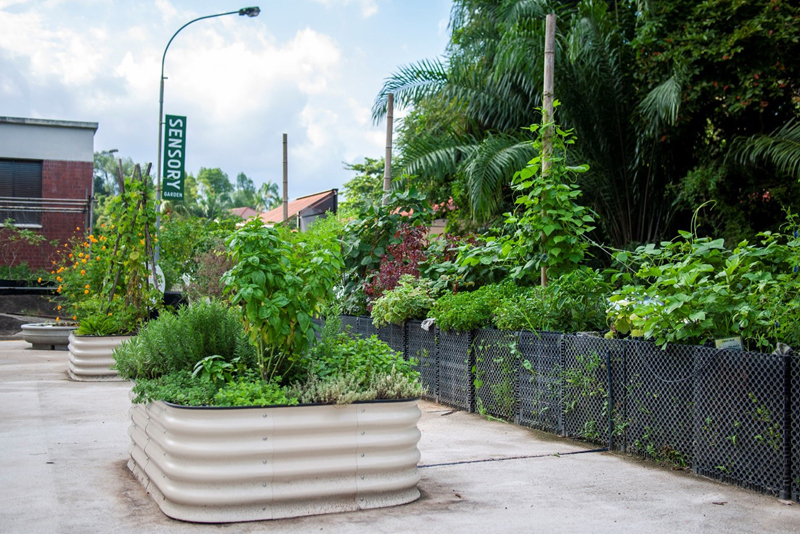Urban Farming: How to Get Started
6 SEP 2023 | by The EGC Team

(Photo credit: Edible Garden City premises on Jalan Penjara)
Starting an urban farm in your community, school, or office building contributes to Singapore's food security, while also providing you with fresh produce at a fraction of the carbon footprint. But how do you even start an urban farm?
Urban farming! The thought of providing plants with loving, tender care strikes a chord of longing in many of us. It can often be difficult to figure out how to start farming. Fret not, your friendly EGC farmers are here to share some tips! In our working with different clients and communities, there are a few key pointers we have found to be useful to new farmers:
Alarming Issues
Are you clear on your purpose? Do you know what you want to grow? An urban farm could be designed for maximum production, for experimentation, for community engagement, to be profitable, and for relaxation & enjoyment. There are several possibilities suited to each purpose and user. Determine what you want to achieve out of the urban farm – and if you aren’t too clear on this, start small!
You’ll also need to know who will champion this process, as it takes regular commitment, regardless of the growing system, to make things work! You will want to check on your farm at least weekly for 30 minutes to 1 hour to catch problems before they become more significant, though if there are issues troubleshooting and remedying, more time might be required working in the garden.
Location
Location, location, location. When we are starting an Urban Farm, where it is placed is key to the farm's success. The ideal location we looking for would have:
-
Lots of sunlight (6-8 hours)
-
Good drainage (doesn’t get waterlogged)
-
Deep soil (at least 30-40cm, and more if you’d want to grow trees)
-
Good accessibility (no one wants to carry plants repeatedly up and down staircases)
-
Access to water (a waterpoint close by so you can run irrigation)
-
Good ventilation & airflow (this is a huge challenge indoors)
While indoor farming is all the craze, this can be a very expensive first step – and it creates many more challenges than you would expect. Plants have been grown outdoors since, well, forever and it’s their natural happy place.
Output
We typically encourage people to work backwards – what is sensible to grow in Singapore and your location, and then figure out if that matches what you want from an Urban Farm.
This is due to the cost constraints of making an unsuitable site, suitable – it’s typically not a great approach.
While many people want to grow plants such as Oregano, Basil, Tomatoes, and the like, it is much easier to grow varieties already acclimatised to the weather such as Thai Basil or Pandan. Growing climate-friendly is key to success as a beginner farmer as otherwise a lot of time, money, and energy would be spent trying to make things right. Trust us, there are plenty of tasty, crunchy, nutritious veggies that do well in our hot and humid climate!
Ensuring that the soil has life
An overlooked part of growing is soil health. Soil is teeming with symbiotic organisms from earthworms to bacteria. Not all soil is created equally – but potting soil + a layer of compost is usually a good way to start.
Ending
We hope this article helps you think about how to get started – find a good spot, identify what is sensible to grow, figure out if this is something you still want to proceed with, and then bring life to the soil!
There is a wealth of information available on YouTube about the details of growing food, so we hope to simply provide a perspective on the process of getting started. However, should you wish to learn more about growing, you may wish to join us for a workshop or two at Edible Garden City!
Edible Garden City is a social enterprise that is dedicated to creating social change through community- centric agriculture, and a recipient of the President’s Award for the Environment 2021 (Organisations). We are a diverse group of local farmers, with the common goal of helping cities become more self-sufficient. We believe that growing our own food connects us with nature and cultivates a sense of community.
Through edible landscaping, or foodscaping, we have activated under-utilised areas into green community spaces. Our closed-loop farming model produces fresh, tasty and nutritious herbs, flowers, and vegetables. Additionally, we teach and support fellow farmers and gardeners, hire from marginalised communities, and employ therapeutic horticulture. We are committed to finding a sustainable solution to managing food waste and achieving greater food resilience in Singapore.
www.ediblegardencity.com